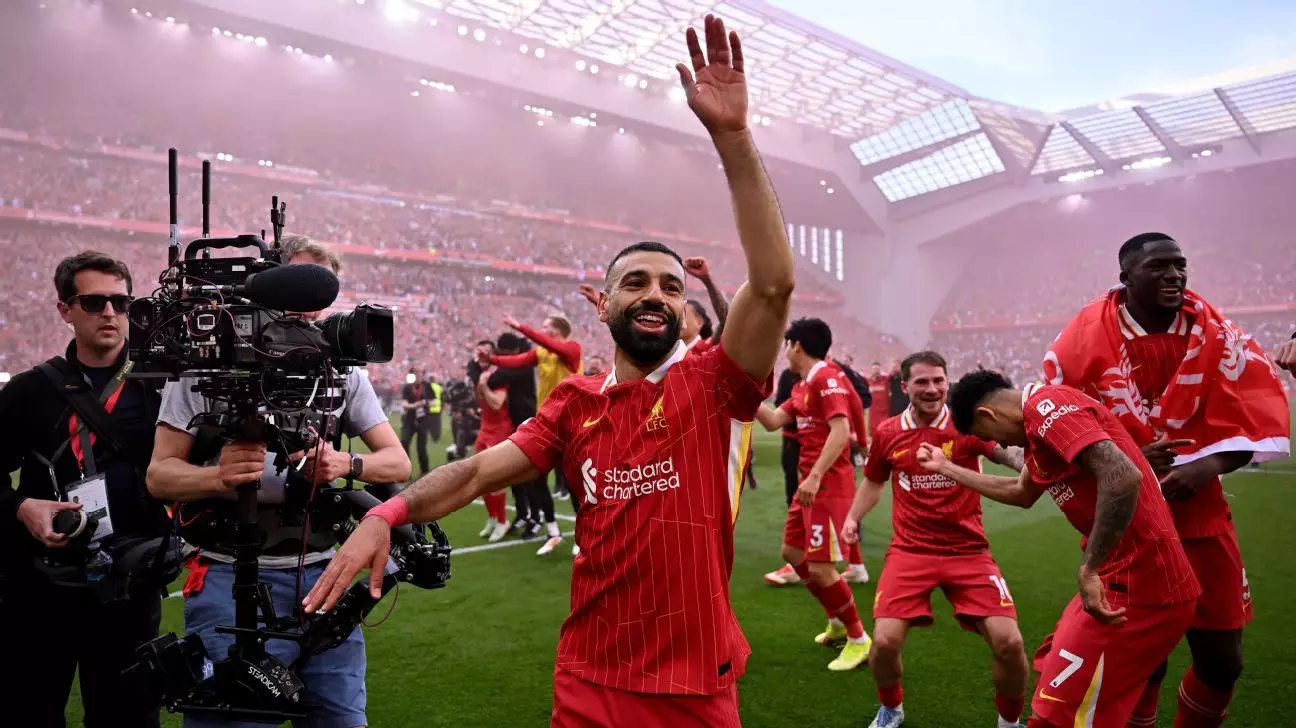As the Football Writers’ Association Player of the Year award fast approaches its 2024 announcement, it carries with it a significant legacy, having been awarded since 1948. This illustrious annual accolade seeks to recognize individual brilliance within the realm of English soccer. With past winners including luminaries like Phil Foden and Mohamed Salah, this year’s contenders are showcasing extraordinary talents that dazzle fans and analysts alike. The narrative of this season features resplendent performances despite intense competition, especially as Liverpool, now under the stewardship of Arne Slot, emerges at the forefront of the Premier League.
The Unassailable Mohamed Salah
Entering into the crux of the debate, it’s challenging to overlook Mohamed Salah, who has been nothing short of phenomenal this season. With a leading number of goals and assists, Salah’s dominance on the pitch is well mirrored by Liverpool’s ascent in the league standings. Currently projected to lead both categories, he is on track to join an exclusive club—only the third player in Premier League history to achieve this remarkable feat. His manifold contributions—evident through an impressive tally of 46 goal involvements—underscore not just his scoring prowess but also his ability to orchestrate play.
Moreover, Salah’s journey has been layered; rumors swirled around his contract situation earlier in the season, creating a potential distraction. Yet, he maintained composure and focus, rising to the occasion week after week. In today’s football landscape, distractions can derail even the most talented players, but Salah has embodied professionalism, asserting himself as not only the face of Liverpool’s success but also as an individual deserving of the highest individual honors.
Bruno Fernandes: A Beacon of Resilience
In stark contrast, the candidacy of Bruno Fernandes deserves attention for completely different reasons. Facing an uphill battle, as Manchester United endures one of its worst league seasons in decades, Fernandes has been a standout figure. With the team languishing around the lower half of the table, he has managed to rouse the squad and deliver stellar performances amidst adversity. Scoring 19 goals and providing 18 assists in an environment rife with difficulty speaks volumes about his value as a player.
The mark of a true player is often revealed in crisis situations, and Fernandes has stepped up as a leader, taking responsibility when others might recoil. His evolution into a leader under pressure illustrates his character and commitment to the club. While some may argue his team’s poor placement negates his candidacy for the Player of the Year award, a deeper analysis reveals that his pivotal performances have kept United afloat during challenging times.
Redefining Expectations: Chris Wood’s Impact
Meanwhile, let us not bypass the unexpected brilliance of Chris Wood. At 33, his contributions to Nottingham Forest have been remarkable, yielding 19 goals and three assists in just 31 matches. In a counter-attacking setup not ideally suited to his style, Wood’s knack for productivity has sparked discussions about the breadth of talent across the league. His goals at crucial junctures have catalyzed Nottingham Forest’s pursuit of Champions League qualification, transforming matches through sheer grit and determination.
Typically, players in lower-ranked teams falter under pressure, yet Wood’s role exemplifies how individual brilliance can resonate even in less glamorous circumstances. His achievements warrant acknowledgment, as they challenge the perception that greatness can only emerge from the league’s elite clubs.
A Holistic Perspective on Performance
While individual statistics often drive narratives surrounding Player of the Year discussions, it’s essential to take a holistic view of contributions throughout the league. The contributions of players like Virgil van Dijk and Ryan Gravenberch encapsulate the essence of teamwork within successful setups. Van Dijk, in particular, stands as a bastion of defensive stability, marrying leadership qualities with on-pitch excellence. His ability to navigate a transitional phase at Liverpool, while remaining a consistent force, cannot be overstated.
Conversely, Gravenberch’s emergence as a pivotal figure in Liverpool’s midfield, especially after being on the periphery, showcases his rejuvenation and capacity to thrive under pressure. These narratives affirm that football is not solely a showcase of individual excellence but rather a testament to group dynamics and shared objectives.
The Verdict: Who Truly Deserves the Title?
In this year’s race for the Football Writers’ Association Player of the Year, fans and analysts must contend with a pivotal question: should the accolade be awarded solely to the player racking up goals and assists, or does it extend to those who stabilize and elevate their teams? While Salah’s electrifying contributions surely place him in the limelight, the stories of resilience, leadership, and profound impact of others like Fernandes and Wood invite appreciation for the multifaceted nature of this beautiful game.
Consequently, discernment is necessary. Individual brilliance will always shine through, but the essence of football often lies within those collaborative efforts that lift teams from mediocrity to glory—reminding us that greatness can be a collective endeavor as much as an individual pursuit.

